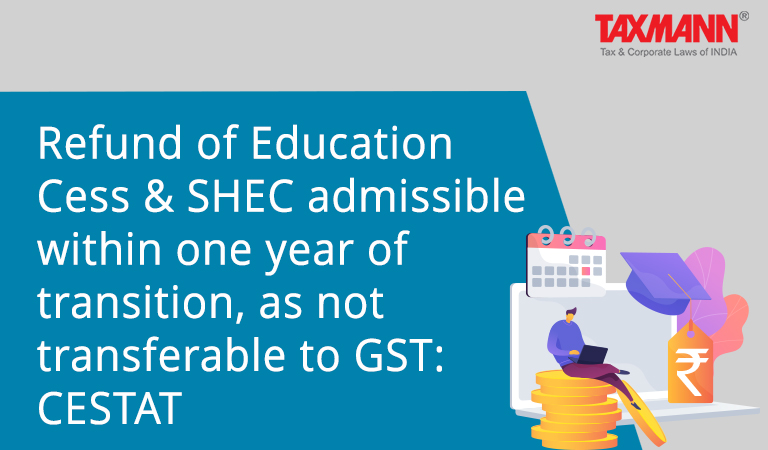Refund of Education Cess & SHEC admissible within one year of transition, as not transferable to GST: CESTAT
- Blog|News|GST & Customs|
- 3 Min Read
- By Taxmann
- |
- Last Updated on 9 December, 2021

Case Details: Kirloskar Toyota Textile Machinery (P.) Ltd. v. Commissioner of Central Tax - [2021] 133 taxmann.com 56 (Bangalore - CESTAT)
Judiciary and Counsel Details
-
- S.S. Garg, Judicial Member
- Akbar Basha, CA for the Appellant.
- P. Gopakumar, Joint Commissioner (AR) for the Respondent.
Facts of the Case
The assessee was a manufacturer of parts and accessories of textile machinery and also renders the commissioning and installation services. It was engaged in the export of services without payment of tax under LUT and availing the benefit of Cenvat Credit facility under Cenvat Credit Rules, 2004. Since, it was engaged in export, there was an accumulated balance of unutilized credit of Education Cess (EC) and Secondary and Higher Education Cess (SHEC) available in the books.
With the introduction of GST, these credits of cess were restricted to be transitioned into GST by virtue of Section 140(1) of the Act. Accordingly, the assessee did not carry forward the accumulated credit of cess in FORM GST TRAN -1 to GST regime. It filed the refund application under section 11B of the Central Excise Act on June 29, 2018.
CESTAT Held
The Tribunal noted that the refund application was filed within a period of one year i.e. on 29/06/2018 from the introduction of GST law.
Further, the Tribunal also took note of a judgement of Karnataka High Court wherein it was held that when the assessee has moved out of Modvat Scheme/Cenvat Scheme, portion of unutilized credit should be allowed as refund. Based on the said judgement and the judgement of Division Bench of the CESTAT, New Delhi in the case of Bharat Heavy Electricals Ltd. case it concluded that the assessee is entitled to refund of an unutilized credit of Education Cess and Higher Education Cess after the introduction of GST.
List of Cases Referred to
-
- Bharat Heavy Electricals Ltd. v. Commissioner of GST, CE & C [2020] 120 taxmann.com 363 (New Delhi – CESTAT) (para 3)
- Eicher Motors Ltd. v. Union of India 1999 taxmann.com 1769 (SC) (para 3)
- Samtel India Ltd. v. CCE 2003 taxmann.com 397 (SC) (para 3)
- Union of India v. Slovak India Trading Co. (P.) Ltd. [2006] 5 STT 332 (Kar.) (para 3)
- CCE&C v. Suresh Synthetics 2007 taxmann.com 1 (SC) (para 3)
- CCE v. Gas Authority of India Ltd. 2008 taxmann.com 847 (SC) (para 3)
- Commissioner of Customs v. Toyo Engineering India Ltd. 2006 taxmann.com 1488 (SC) (para 3)
- Schlumberger Asia Services Ltd. v. Commissioner of CE & ST [2021] 127 taxmann.com 509 (Chd. – CESTAT) (para 3.1)
- Bhavin Textiles v. CCE 2006 (194) E.L.T. 79 (Trib. – Mum.) (para 3.1)
- CCE v. Apex Drugs and Intermediates Ltd. 2014 (314) E.L.T. 729 (Trib. – Bang) (para 3.1)
- CCE v. Jain Vanguard Polybutlene Ltd. 2010 (256) E.L.T. 523 (Bom.) (para 3.1)
- Bangalore Cables (P.) Ltd. v. CCE 2017 (347) E.L.T. 100 (Trib.-Bang.) (para 3.1)
- Shalu Synthetics (P.) Ltd. v. CCE [2014] 47 taxmann.com 357/46 GST 676 (Ahd. – CESTAT) (para 3.1)
- Century Rayon Twisting Unit v. CCE 2015 (325) E.L.T. 205 (Trib. -Mum.) (para 3.1)
- CCE & C (Appeals) v. Kores (India) Ltd. 2009 (245) E.L.T. 411 (Trib. – Bang.) (para 3.1)
- Siddharth Enterprises v. Nodal Officer [2019] 109 taxmann.com 62 (Guj.) (para 3.2)
- Bharat Heavy Electricals Ltd. v. Commissioner of Central Tax [2020] 115 taxmann.com 32 (Hyd. – CESTAT) (para 4)
- Mylan Laboratories Ltd. v. CCT & C [Central Excise Appeal No. 30591 of 2019, 25-2-2020] (para 4)
- Gauri Plasticulture (P.) Ltd. v. CCE [2019] 30 GSTL 224 (Bom.) (para 4)
- Banswara Syntex Ltd. v. CCE & ST 2019(365) E.L.T. 773 (Raj.) (para 4)
- Asstt. Commissioner of CGST & CE v. Sutherland Global Services (P.) Ltd.[2020] 120 taxmann.com 295 (Mad.) (para 4)
- Commissioner v. Andhra Sugars Ltd. 2015 (319) E.L.T. 297 (A.P.) (para 5)
- J.K. Tyre & Industries Ltd. v. Asstt.CCE 2016 (340) E.L.T. 193 (Bang. – CESTAT) (LB) (para5).
Disclaimer: The content/information published on the website is only for general information of the user and shall not be construed as legal advice. While the Taxmann has exercised reasonable efforts to ensure the veracity of information/content published, Taxmann shall be under no liability in any manner whatsoever for incorrect information, if any.

Taxmann Publications has a dedicated in-house Research & Editorial Team. This team consists of a team of Chartered Accountants, Company Secretaries, and Lawyers. This team works under the guidance and supervision of editor-in-chief Mr Rakesh Bhargava.
The Research and Editorial Team is responsible for developing reliable and accurate content for the readers. The team follows the six-sigma approach to achieve the benchmark of zero error in its publications and research platforms. The team ensures that the following publication guidelines are thoroughly followed while developing the content:
- The statutory material is obtained only from the authorized and reliable sources
- All the latest developments in the judicial and legislative fields are covered
- Prepare the analytical write-ups on current, controversial, and important issues to help the readers to understand the concept and its implications
- Every content published by Taxmann is complete, accurate and lucid
- All evidence-based statements are supported with proper reference to Section, Circular No., Notification No. or citations
- The golden rules of grammar, style and consistency are thoroughly followed
- Font and size that’s easy to read and remain consistent across all imprint and digital publications are applied




 CA | CS | CMA
CA | CS | CMA
